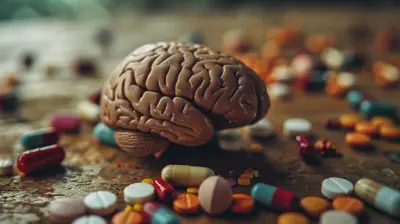7 April 2025
Depression is like an uninvited guest that overstays its welcome, messing with everything, including your memory and concentration. Ever walked into a room and completely forgotten why you went in? Now imagine that happening all the time—frustrating, right?
If you've been feeling foggy, forgetful, or unable to focus, depression might be the culprit. But why does it happen? And more importantly, is there a way to reclaim your mental clarity? Let’s dive in and untangle how depression hijacks your brainpower, and what you can do about it. 
How Does Depression Affect Memory and Concentration?
Depression isn’t just about feeling sad. It’s a sneaky, complex condition that can mess with your brain in ways you wouldn’t expect. And unfortunately, your memory and ability to concentrate often take a major hit.1. Brain Fog: The Mental Cloud That Won’t Budge
Imagine your brain is like a high-speed internet connection. On a good day, thoughts flow smoothly, and everything loads instantly. But when depression strikes, it’s like your brain is stuck on a slow, glitchy Wi-Fi network—it takes forever to process information, and sometimes, it just won’t load at all.This frustrating experience is often referred to as "brain fog," a common symptom of depression that makes everything feel sluggish and unclear. One moment you're having a conversation, and the next, you've completely lost your train of thought. Sound familiar?
2. Short-Term Memory Loss: Where Did I Leave That Again?
Ever put your phone down and immediately forget where you placed it? Normally, we all have forgetful moments, but depression turns minor lapses into a daily struggle.The hippocampus—the brain’s memory center—actually shrinks in people with long-term depression. This can make it harder to retain new information, recall details, and keep track of daily tasks. Instead of remembering what your friend just told you, your brain is stuck rehashing negative thoughts.
3. Poor Concentration: The Attention Span of a Goldfish
Trying to focus while dealing with depression is like reading a book in the middle of a rock concert—nearly impossible. Simple tasks like answering emails, following a conversation, or even watching your favorite TV show can feel like a mental marathon.This lack of focus isn't laziness—it’s a direct result of depression's impact on neurotransmitters like serotonin and dopamine, which affect motivation and attention. If you find yourself zoning out more than usual, don’t be too hard on yourself. Your brain is in crisis mode, and focus takes a back seat. 
Why Does Depression Mess with Your Brain?
Now that we know depression can sabotage memory and focus, let’s break down the science behind it.1. Stress Hormones Overload Your Brain
When you're depressed, your brain produces an excess of cortisol (the stress hormone). While a little cortisol is fine, too much of it is like an overprotective friend who never lets you relax. High cortisol levels damage the hippocampus, making memory and learning more challenging.2. Neurotransmitter Imbalance
Your brain relies on a balanced mix of neurotransmitters to function properly. Think of it like a well-coordinated orchestra—when depression takes over, the conductor (your brain) stops keeping things in sync, and everything falls apart.Low levels of serotonin, dopamine, and norepinephrine can lead to difficulties in concentration, motivation, and recall. No wonder even simple tasks feel overwhelming!
3. Lack of Sleep Worsens Cognitive Decline
Depression often comes hand-in-hand with sleep disturbances—either you can't fall asleep, or you sleep too much and still wake up exhausted. Poor sleep makes it even harder for your brain to process and store new information. It’s like trying to run on an empty fuel tank.
How to Improve Memory and Focus When Battling Depression
The good news? You can fight back. While depression can wreak havoc on your cognitive abilities, there are ways to regain control and clear the mental fog.1. Prioritize Sleep Like Your Life Depends on It (Because It Kind of Does)
A well-rested brain is a sharper brain. Sticking to a consistent sleep schedule, avoiding late-night screen time, and creating a bedtime routine can significantly improve both memory and focus.2. Get Moving—Your Brain Will Thank You
Exercise isn’t just for getting in shape; it’s one of the best tools for improving mental clarity. Physical activity increases blood flow to the brain, boosts dopamine and serotonin levels, and reduces cortisol. Even a 20-minute walk can make a difference.3. Eat Brain-Boosting Foods
Your diet plays a crucial role in cognitive function. Foods rich in omega-3s (like salmon and walnuts), antioxidants (like blueberries and spinach), and healthy fats (like avocados) help protect brain cells and support neurotransmitter function.4. Challenge Your Brain
Engage in activities that push your brain to work a little harder—reading, puzzles, learning a new skill, or even playing a new instrument. Think of it as mental weightlifting for your memory muscles.5. Practice Mindfulness and Meditation
Mindfulness techniques can help you stay present, reduce stress, and improve focus. Meditation, in particular, has been shown to increase gray matter in the brain, which is essential for memory and learning.6. Seek Professional Help
If depression is taking a serious toll on your cognitive abilities, don’t hesitate to reach out to a therapist or doctor. Therapy, medication, or a combination of both can help regulate neurotransmitter levels and improve overall mental function.
Final Thoughts
Depression and cognitive struggles often go hand in hand, making everyday life feel like an uphill battle. But understanding why it happens—and taking proactive steps to counteract its effects—can make a world of difference.Be patient with yourself. Recovering your memory and focus isn’t an overnight fix, but with the right strategies, you can reclaim control over your mind. And remember, you’re not alone in this fight—help is always available, and brighter days are ahead.




Beau McMillen
Thank you for shedding light on such an important topic. Understanding the connection between depression and cognitive function is vital for both individuals and their loved ones. Your insights provide hope and encourage conversations that can lead to healing and support.
April 15, 2025 at 4:19 AM